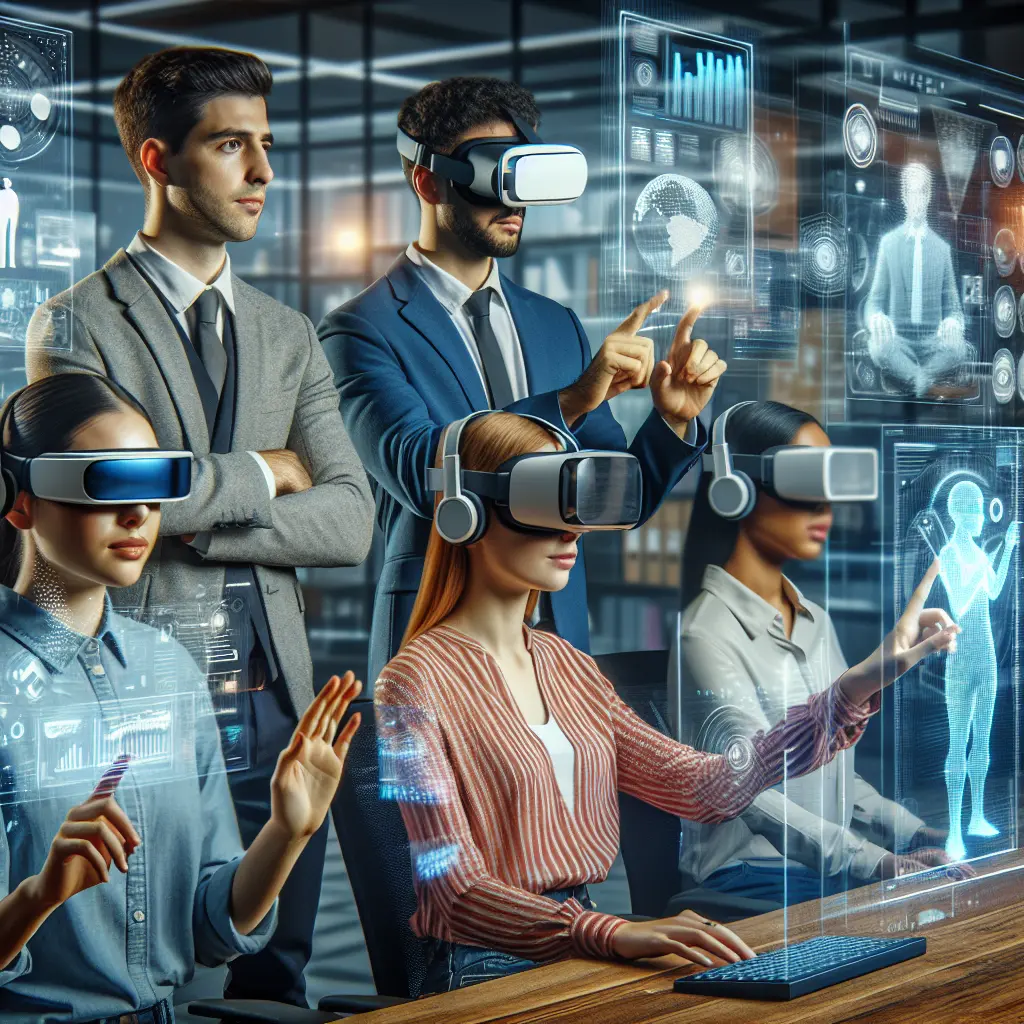
In today's rapidly evolving business landscape, virtual reality (VR) is reshaping the future of workplace collaboration by offering innovative solutions that transcend traditional methods. This section delves into how VR is redefining workplace dynamics, enhancing productivity, and fostering immersive work environments.
A New Era of Connectivity: VR Remote Teamwork
Virtual meetings with VR are bridging geographical gaps, enabling teams to collaborate seamlessly from anywhere in the world. With VR collaboration tools, businesses can facilitate virtual reality team-building exercises that not only engage employees but also strengthen corporate culture. This approach fosters a sense of presence and immediacy, crucial for remote teams seeking cohesion and productivity.
For instance, Meta's investment in VR communication platforms demonstrates the industry's commitment to enhancing connectivity through immersive experiences. Despite the closure of Ready at Dawn Studios, Meta continues to prioritize VR development, indicating a strategic shift towards more integrated VR solutions for workplace collaboration.
Immersive Work Environments: Beyond Traditional Office Spaces
Virtual reality office solutions are no longer just futuristic concepts; they are becoming integral to creating immersive work environments that promote creativity and interaction. Recent developments in Meta's Quest News, including AI integrations and avatar enhancements, highlight how VR technology is increasingly being tailored to professional settings.
These advancements allow employees to interact in virtual spaces that mimic real-world environments, fostering a sense of belonging and facilitating collaboration. The integration of AI into VR platforms further enhances productivity by automating routine tasks and providing intelligent insights during virtual meetings.
Enhancing Productivity with VR: Practical Applications
The future of work with virtual reality includes practical applications such as virtual reality corporate training. This hands-on approach allows employees to develop skills in a safe, controlled environment, significantly improving learning outcomes. According to a study published in Harvard Business Review, VR training programs can increase retention rates by up to 75% compared to traditional training methods.
Moreover, VR for remote work enables companies to maintain operational efficiency while reducing overhead costs associated with physical office spaces. By adopting VR office solutions, businesses can ensure seamless workflow continuity regardless of geographic location.
Workplace Innovation with VR: A Catalyst for Change
As companies recognize the potential of VR in business collaboration, they are investing in technologies that drive innovation. For example, the recent drop in price for Sony's PlayStation VR2 makes it more accessible for businesses looking to explore VR's capabilities. This affordability allows smaller enterprises to leverage VR tools without significant financial strain.
Additionally, innovations such as Meta's patent that mimics Apple's EyeSight feature emphasize the importance of social presence in virtual environments. By making users' eyes visible to others on external displays, this technology aims to reduce social isolation in VR settings, enhancing the collaborative experience.
Future Prospects: Embracing the Full Potential of VR
The journey from reality to fantasy is being accelerated by technologies like Live2Diff AI, which offers real-time video stylization as highlighted by TechCrunch. This capability can be harnessed in virtual meetings to create engaging presentations and dynamic content that captivate audiences.
Looking ahead, the adoption of VR in business collaboration will likely expand beyond current applications. As more companies embrace these technologies, we can expect to see further integration of virtual reality into everyday work processes, ultimately shaping a new paradigm in workplace dynamics.
Conclusion: Embracing the Future of Workplace Collaboration with VR
Virtual reality is revolutionizing workplace collaboration by offering solutions that go beyond traditional methods, reshaping how teams connect and interact. VR technology has opened new doors for remote teamwork, providing immersive environments that bridge geographical distances and enhance corporate culture. Companies like Meta are spearheading this transformation, ensuring that VR continues to evolve as a tool for seamless connectivity and collaboration.
By creating immersive workspaces, VR not only fosters creativity but also enhances productivity. The integration of AI in virtual environments automates tasks and enriches virtual meetings, further driving efficiency. VR corporate training programs showcase practical applications by significantly improving skill retention and reducing operational costs for businesses.
Moreover, the growing accessibility of VR technologies, such as the PlayStation VR2, enables even smaller businesses to explore its potential without financial burden. Innovations in VR features emphasize social presence, reducing isolation and promoting a collaborative spirit.
As VR continues to transform business dynamics, it is crucial for professionals and enthusiasts to stay informed about these advancements. Whether through adopting VR tools or participating in virtual team-building exercises, the opportunities for growth and innovation are limitless.
Now, it's your turn. How do you see VR changing your work environment? What are your thoughts on the integration of VR in everyday business processes? Share your experiences and insights in the comments below. Together, let's embrace this transformative journey and redefine our approach to workplace collaboration.
Stay curious, stay connected, and let's explore the limitless possibilities of VR together.
Author: Elise Hawthorne